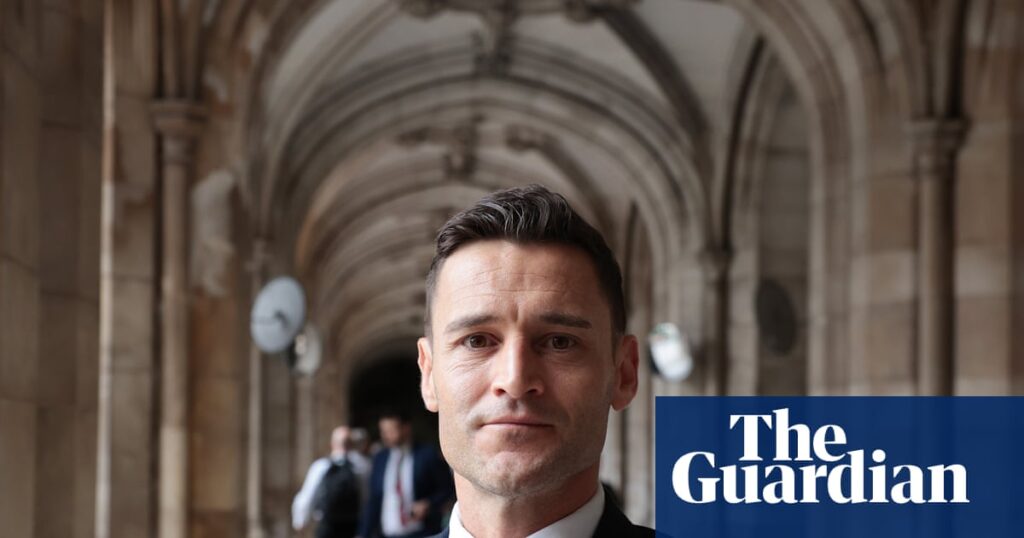Politicians are at risk of ignoring a large chunk of the electorate because of their reluctance to communicate on TikTok, according to a Tory MP who has one of the biggest followings of any UK politician on the social media platform.
Luke Evans, who is the sixth-most followed UK politician on TikTok, said his colleagues were missing out on engaging particularly with young voters because of security concerns and a lack of knowledge about the platform.
TikTok has been Britain’s fastest-growing source of news for several years. The regulator Ofcom calculates that 11% of adults in the UK use the platform as a news source. Among children aged 12-15, the proportion is 30%, of whom 12% cite TikTok as their main source.
“You’ve got to be where the electorate are,” Evans told the Guardian. “This is one of the biggest apps that is used across the country and across the word. I think it’s right to be there, to be talking to people.
“And from a party political point of view, if you’re crowded out and you’re not speaking to people, that space will get filled. Hearing 20% of someone versus nothing from someone else is huge.”
Only 10% of Conservative MPs use TikTok, according to a recent Guardian analysis, compared with nearly 25% of their Labour colleagues. In 2023, Rishi Sunak’s government banned TikTok on government devices because of concerns over how the platform’s Chinese owners would treat user data.
In comparison, those on the populist right and left are far more active on the platform – chief among them Nigel Farage, who has 1.3 million followers. Jeremy Corbyn has 223,000, while Zarah Sultana, the co-leader of his new party, has nearly 480,000.
With 52,000 followers, Evans’ profile is much smaller, but it makes him the most followed Conservative MP on the platform, and one of a rare group who have carved out a presence on it from the centre-right of politics. As a trained GP, Evans said it led to him being recognised as the “TikTok doctor MP” in bars, constituency events and even once, on a tourist bus in Iceland.
He said he had carved out a niche in part by answering simple, non-partisan questions about the way parliament worked – something he said traditional political communication often failed to do. Evans urged other MPs also to use the platform to talk more about the basics of their day jobs.
“I come as an outsider to Westminster, I certainly thought, I don’t understand how the processes work,” he said. “Maybe I could educate people on that basis.
“Let’s explain what happens when an MP wants to pass a bill, or how do they ask a question, all the simple things that you go ask, and there was an amazing appetite for it, and that created a rolling avalanche of interest, with people asking more and more questions.”
He added: “It very much lends itself to being able to answer questions quickly, give people advice, talk about nuances. Voting records was an interesting one – trying to explain the idea of how voting records work, because people don’t understand that.”
Evans’s most popular video, with 2m views, is one in which he stands up in the Commons and reads out a poem written about Queen Elizabeth after her death. He said he decided to read the poem after seeing it trending on social media and realising it had the potential to resonate more than some of the personal anecdotes about the queen that other MPs were sharing.
“I was very tired when I got there, but I thought: ‘You know what, let’s try it,’” he said. “And so I read it out and cut it up [edited it]. You put some music on it, and very, very quickly it picked up.”
But Evans also warned about the impact that TikTok was having on some young men in particular, whom he said were being ignored by mainstream politicians and finding solace instead in extreme social media content and influencers.
“Andrew Tate was very good at playing into that,” Evans said, referring to the self-styled “misogynist influencer”.
He added: “One of the commonest trends about 18 months ago was a woman on the screen asking men: ‘Guys, when times are tough, who do you talk to?’
“And it was just reposted repeatedly with young men saying ‘no one’, ‘there’s no one there’, ‘no one cares’, ‘no one listens’. Man after man after man just coming up and lining that up. It’s really harrowing, because they’re genuine, raw videos, and it cuts through.”
But turning to his colleagues, Evans said that despite concerns about harmful content and the platform’s Chinese owners,politicians needed to be on TikTok to understand what many people were thinking.
“People will naturally lead you where you need to look,” he said. “In the old days, they used to write to us. In recent times, they’ll email us. Now it’s social media trends.”


